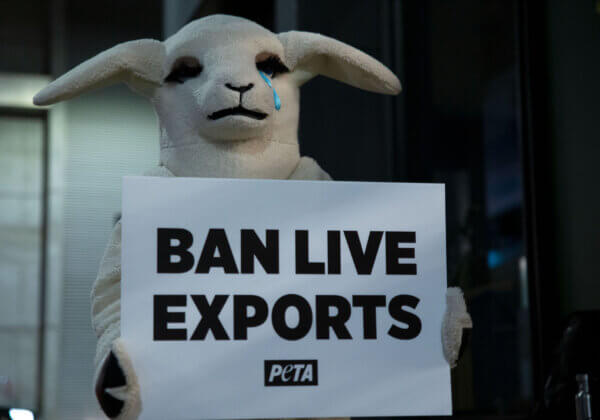What to Do if You See Foie Gras on a Menu
Foie gras, French for “fatty liver”, is made from the grotesquely enlarged livers of male ducks and geese. France supplies 74 per cent of the foie gras sold worldwide, and eyewitness footage shot on French foie gras farms shows ducks confined individually to cramped shoebox-like cages with slits in the top that allow their heads to protrude in order to facilitate force-feeding. The cages are so small that the birds can only stand up and sit down. They can’t even turn around or spread a single wing. Some have bloody wounds and abscesses, and others are covered with vomit. Many pant and gasp for breath because their lungs are compressed by their livers. You can learn more about foie gras production by watching this exposé narrated by Kate Winslet.
How You Can Help
Businesses rely on their customers to let them know what they’re doing right or wrong. If you patronise a restaurant and see foie gras on the menu, politely let the staff know you are disturbed to see that they are supporting this gratuitous cruelty. You can speak to the manager or send a letter or e-mail when you get home. Below is a sample letter that includes some of the points you may wish to convey:
Dear [Sir/Madam],
I’m writing to ask you to stop offering foie gras at your restaurant. You’d be in good company in doing so: Prince Charles banned it from the menu at all royal residences, and Stamford Hotels and Resorts did the same in all its Australian restaurants.
Foie gras, French for “fatty liver”, is made from the grotesquely enlarged livers of male ducks and geese. You may not realise that the birds are kept inside tiny wire cages or packed into sheds. Two or three times every day, up to 2 kilograms of grain and fat are pumped into their stomachs via pipes shoved down their throats. This force-feeding causes their livers to become diseased and swell to up to 10 times their normal size. Many become too sick to stand. The pipes can puncture their throats, and the massive amount of food sometimes ruptures their stomachs and other internal organs. Female hatchlings, who are useless to foie gras farmers, are often drowned in scalding-hot water, suffocated in plastic bags, or shredded alive in macerators.
Foie gras production is so cruel that it is banned in the Czech Republic, Denmark, Finland, Germany, Israel, Luxembourg, Norway, Poland, Sweden, Switzerland, and the UK. In the US, California banned its production and sale throughout the state in 2012.
Your restaurant has the chance to become a leader in ending the sale and consumption of foie gras by removing it from your menu, and you will win my strongest recommendation if you do so.
Thank you for your consideration of this important matter. Please let me know your decision at your earliest convenience. I look forward to hearing from you.
Sincerely,
[Your Name]
You may be surprised by how receptive restaurants often are to such feedback. For example, contestants in a 2016 episode of the popular home-renovation show The Block were shown dining at the Eureka 89 restaurant in Melbourne, and unfortunately, the meal included foie gras. But after PETA contacted the restaurant to inform staff of the way foie gras is produced, Eureka 89 confirmed that it has been removed from the current offerings and the chef assured us that he will not include it on any future menus!
Restaurants That Have Dropped Foie Gras
These restaurants ditched foie gras after being contacted by PETA or our supporters:
- The Dining Room at Park Hyatt
- Eureka 89
- Fix Wine Bar + Restaurant
- Hell of the North
- Kazuki’s
- Lilianfels
- Stamford Plaza (all restaurants owned by the hotel)
If you succeed in persuading a restaurant to drop foie gras, please contact us and let us know so that we can thank the manager.
And please sign our petition to help us eradicate this vile product for good.







